Causal Analysis Essay: Defining Terms, Analyzing Errors and Effects
VerifiedAdded on 2022/09/09
|6
|1327
|24
Essay
AI Summary
This essay provides a comprehensive analysis of causal analysis, addressing the core concepts of definitions, reasoning errors, and their practical application. The essay begins by explaining how writers can effectively define unfamiliar terms using synonyms, essential definitions, and extend...
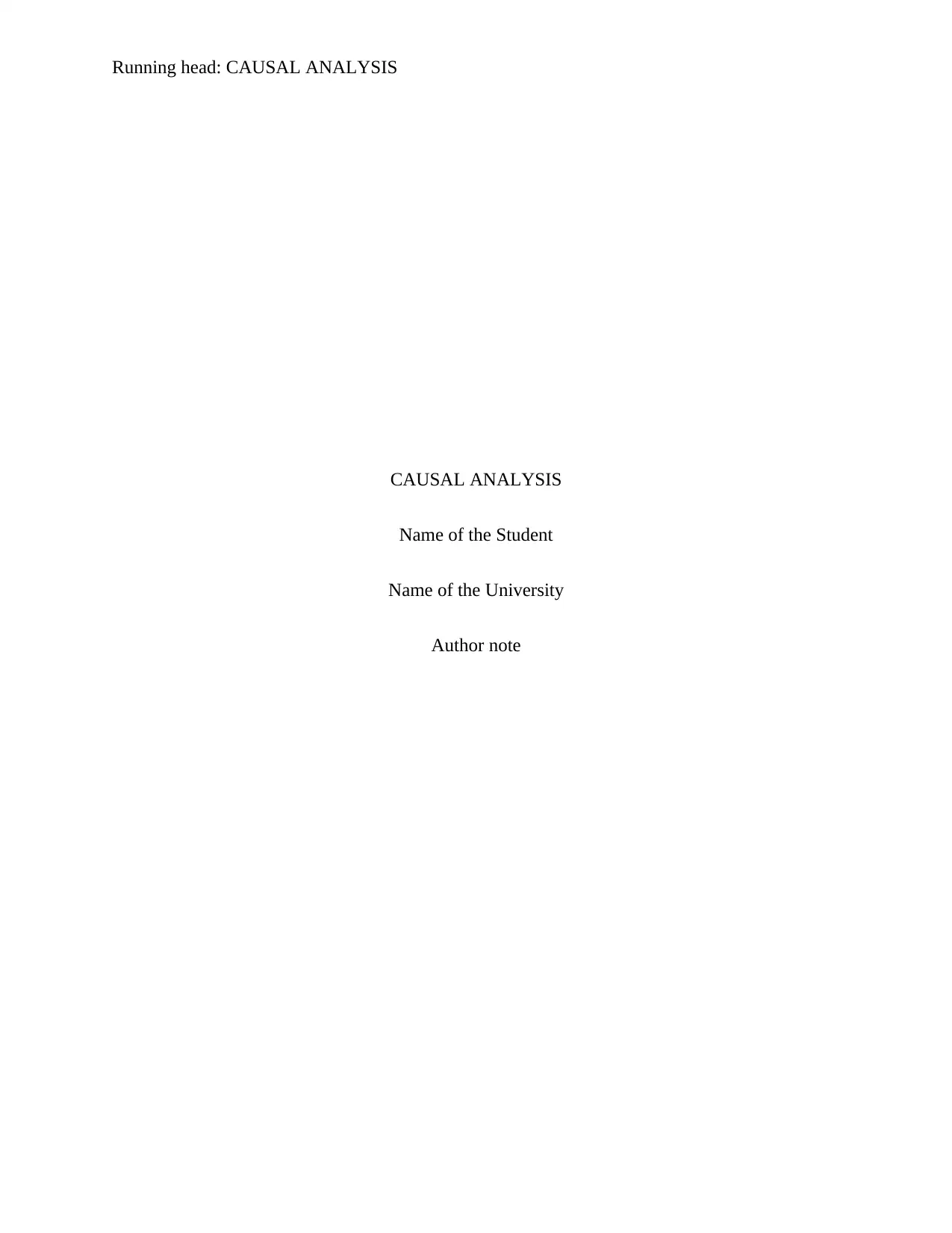
Running head: CAUSAL ANALYSIS
CAUSAL ANALYSIS
Name of the Student
Name of the University
Author note
CAUSAL ANALYSIS
Name of the Student
Name of the University
Author note
Paraphrase This Document
Need a fresh take? Get an instant paraphrase of this document with our AI Paraphraser
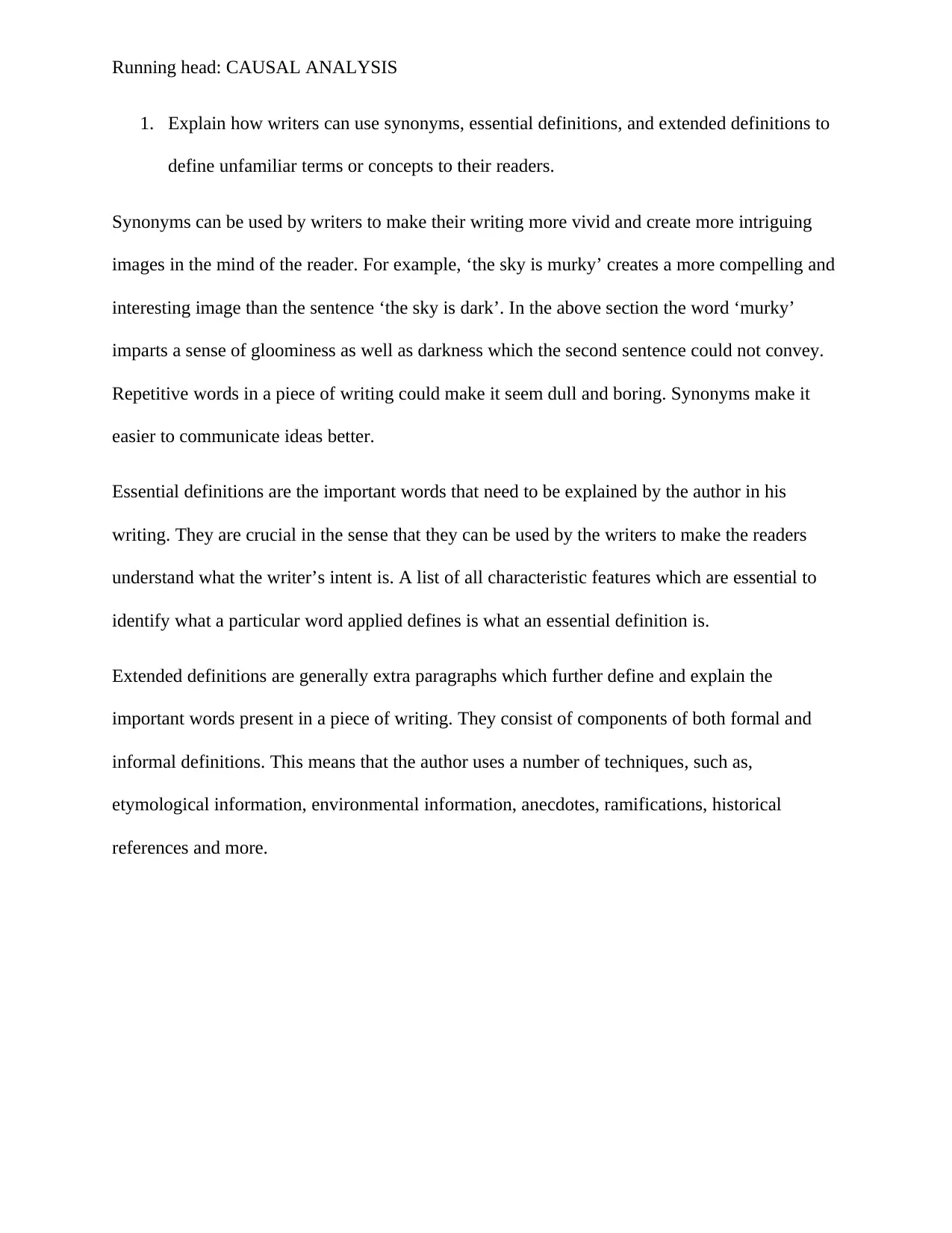
Running head: CAUSAL ANALYSIS
1. Explain how writers can use synonyms, essential definitions, and extended definitions to
define unfamiliar terms or concepts to their readers.
Synonyms can be used by writers to make their writing more vivid and create more intriguing
images in the mind of the reader. For example, ‘the sky is murky’ creates a more compelling and
interesting image than the sentence ‘the sky is dark’. In the above section the word ‘murky’
imparts a sense of gloominess as well as darkness which the second sentence could not convey.
Repetitive words in a piece of writing could make it seem dull and boring. Synonyms make it
easier to communicate ideas better.
Essential definitions are the important words that need to be explained by the author in his
writing. They are crucial in the sense that they can be used by the writers to make the readers
understand what the writer’s intent is. A list of all characteristic features which are essential to
identify what a particular word applied defines is what an essential definition is.
Extended definitions are generally extra paragraphs which further define and explain the
important words present in a piece of writing. They consist of components of both formal and
informal definitions. This means that the author uses a number of techniques, such as,
etymological information, environmental information, anecdotes, ramifications, historical
references and more.
1. Explain how writers can use synonyms, essential definitions, and extended definitions to
define unfamiliar terms or concepts to their readers.
Synonyms can be used by writers to make their writing more vivid and create more intriguing
images in the mind of the reader. For example, ‘the sky is murky’ creates a more compelling and
interesting image than the sentence ‘the sky is dark’. In the above section the word ‘murky’
imparts a sense of gloominess as well as darkness which the second sentence could not convey.
Repetitive words in a piece of writing could make it seem dull and boring. Synonyms make it
easier to communicate ideas better.
Essential definitions are the important words that need to be explained by the author in his
writing. They are crucial in the sense that they can be used by the writers to make the readers
understand what the writer’s intent is. A list of all characteristic features which are essential to
identify what a particular word applied defines is what an essential definition is.
Extended definitions are generally extra paragraphs which further define and explain the
important words present in a piece of writing. They consist of components of both formal and
informal definitions. This means that the author uses a number of techniques, such as,
etymological information, environmental information, anecdotes, ramifications, historical
references and more.
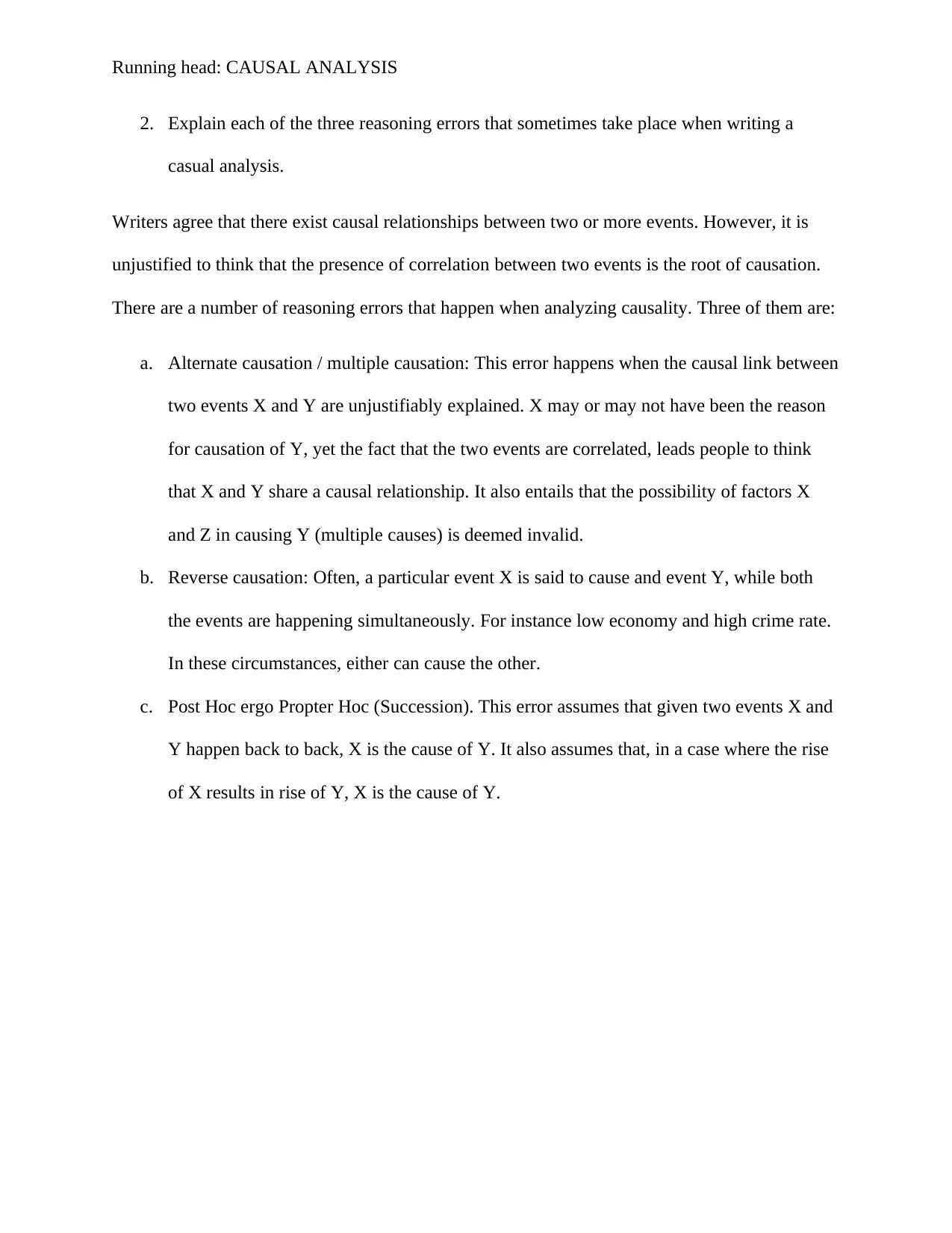
Running head: CAUSAL ANALYSIS
2. Explain each of the three reasoning errors that sometimes take place when writing a
casual analysis.
Writers agree that there exist causal relationships between two or more events. However, it is
unjustified to think that the presence of correlation between two events is the root of causation.
There are a number of reasoning errors that happen when analyzing causality. Three of them are:
a. Alternate causation / multiple causation: This error happens when the causal link between
two events X and Y are unjustifiably explained. X may or may not have been the reason
for causation of Y, yet the fact that the two events are correlated, leads people to think
that X and Y share a causal relationship. It also entails that the possibility of factors X
and Z in causing Y (multiple causes) is deemed invalid.
b. Reverse causation: Often, a particular event X is said to cause and event Y, while both
the events are happening simultaneously. For instance low economy and high crime rate.
In these circumstances, either can cause the other.
c. Post Hoc ergo Propter Hoc (Succession). This error assumes that given two events X and
Y happen back to back, X is the cause of Y. It also assumes that, in a case where the rise
of X results in rise of Y, X is the cause of Y.
2. Explain each of the three reasoning errors that sometimes take place when writing a
casual analysis.
Writers agree that there exist causal relationships between two or more events. However, it is
unjustified to think that the presence of correlation between two events is the root of causation.
There are a number of reasoning errors that happen when analyzing causality. Three of them are:
a. Alternate causation / multiple causation: This error happens when the causal link between
two events X and Y are unjustifiably explained. X may or may not have been the reason
for causation of Y, yet the fact that the two events are correlated, leads people to think
that X and Y share a causal relationship. It also entails that the possibility of factors X
and Z in causing Y (multiple causes) is deemed invalid.
b. Reverse causation: Often, a particular event X is said to cause and event Y, while both
the events are happening simultaneously. For instance low economy and high crime rate.
In these circumstances, either can cause the other.
c. Post Hoc ergo Propter Hoc (Succession). This error assumes that given two events X and
Y happen back to back, X is the cause of Y. It also assumes that, in a case where the rise
of X results in rise of Y, X is the cause of Y.
⊘ This is a preview!⊘
Do you want full access?
Subscribe today to unlock all pages.

Trusted by 1+ million students worldwide
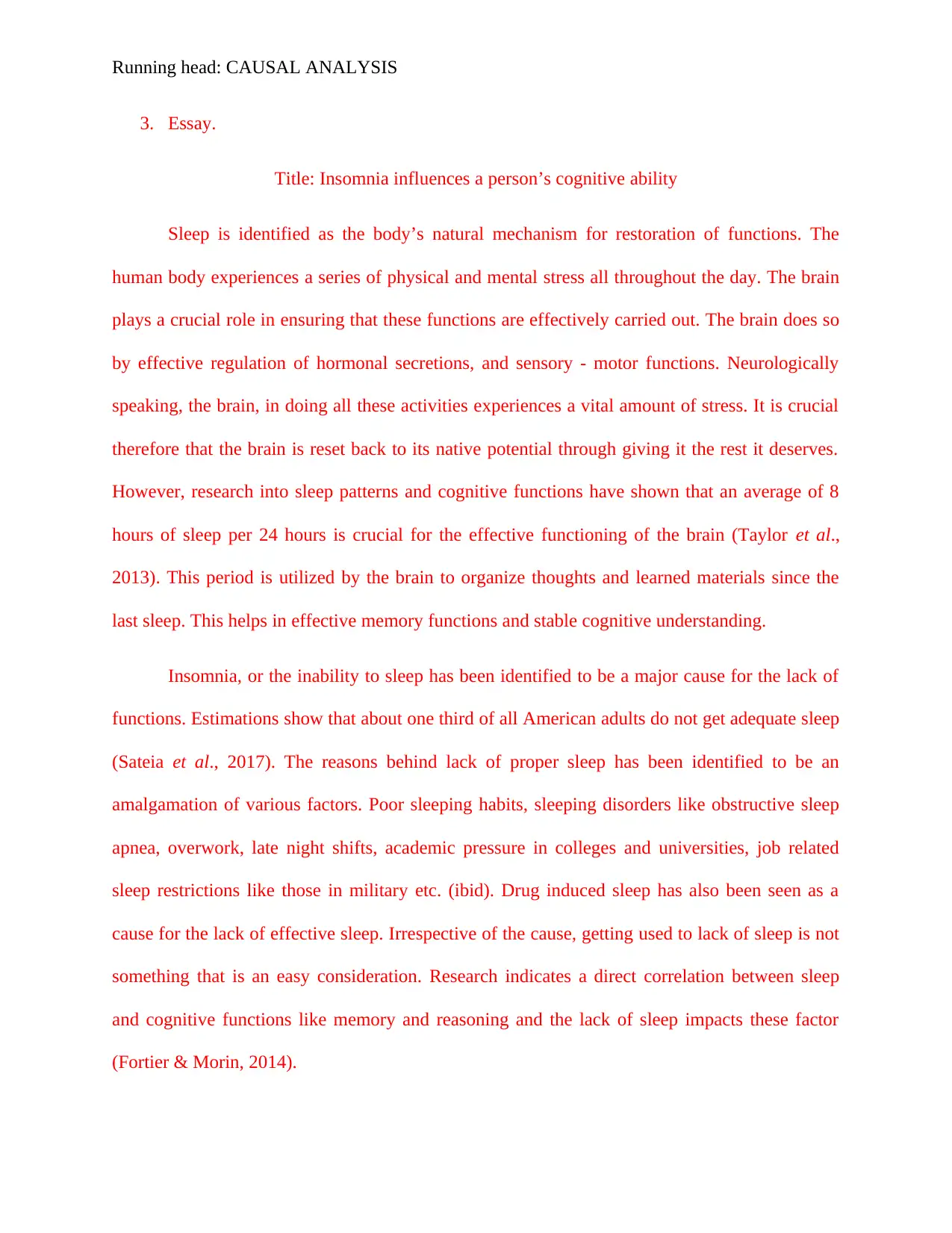
Running head: CAUSAL ANALYSIS
3. Essay.
Title: Insomnia influences a person’s cognitive ability
Sleep is identified as the body’s natural mechanism for restoration of functions. The
human body experiences a series of physical and mental stress all throughout the day. The brain
plays a crucial role in ensuring that these functions are effectively carried out. The brain does so
by effective regulation of hormonal secretions, and sensory - motor functions. Neurologically
speaking, the brain, in doing all these activities experiences a vital amount of stress. It is crucial
therefore that the brain is reset back to its native potential through giving it the rest it deserves.
However, research into sleep patterns and cognitive functions have shown that an average of 8
hours of sleep per 24 hours is crucial for the effective functioning of the brain (Taylor et al.,
2013). This period is utilized by the brain to organize thoughts and learned materials since the
last sleep. This helps in effective memory functions and stable cognitive understanding.
Insomnia, or the inability to sleep has been identified to be a major cause for the lack of
functions. Estimations show that about one third of all American adults do not get adequate sleep
(Sateia et al., 2017). The reasons behind lack of proper sleep has been identified to be an
amalgamation of various factors. Poor sleeping habits, sleeping disorders like obstructive sleep
apnea, overwork, late night shifts, academic pressure in colleges and universities, job related
sleep restrictions like those in military etc. (ibid). Drug induced sleep has also been seen as a
cause for the lack of effective sleep. Irrespective of the cause, getting used to lack of sleep is not
something that is an easy consideration. Research indicates a direct correlation between sleep
and cognitive functions like memory and reasoning and the lack of sleep impacts these factor
(Fortier & Morin, 2014).
3. Essay.
Title: Insomnia influences a person’s cognitive ability
Sleep is identified as the body’s natural mechanism for restoration of functions. The
human body experiences a series of physical and mental stress all throughout the day. The brain
plays a crucial role in ensuring that these functions are effectively carried out. The brain does so
by effective regulation of hormonal secretions, and sensory - motor functions. Neurologically
speaking, the brain, in doing all these activities experiences a vital amount of stress. It is crucial
therefore that the brain is reset back to its native potential through giving it the rest it deserves.
However, research into sleep patterns and cognitive functions have shown that an average of 8
hours of sleep per 24 hours is crucial for the effective functioning of the brain (Taylor et al.,
2013). This period is utilized by the brain to organize thoughts and learned materials since the
last sleep. This helps in effective memory functions and stable cognitive understanding.
Insomnia, or the inability to sleep has been identified to be a major cause for the lack of
functions. Estimations show that about one third of all American adults do not get adequate sleep
(Sateia et al., 2017). The reasons behind lack of proper sleep has been identified to be an
amalgamation of various factors. Poor sleeping habits, sleeping disorders like obstructive sleep
apnea, overwork, late night shifts, academic pressure in colleges and universities, job related
sleep restrictions like those in military etc. (ibid). Drug induced sleep has also been seen as a
cause for the lack of effective sleep. Irrespective of the cause, getting used to lack of sleep is not
something that is an easy consideration. Research indicates a direct correlation between sleep
and cognitive functions like memory and reasoning and the lack of sleep impacts these factor
(Fortier & Morin, 2014).
Paraphrase This Document
Need a fresh take? Get an instant paraphrase of this document with our AI Paraphraser
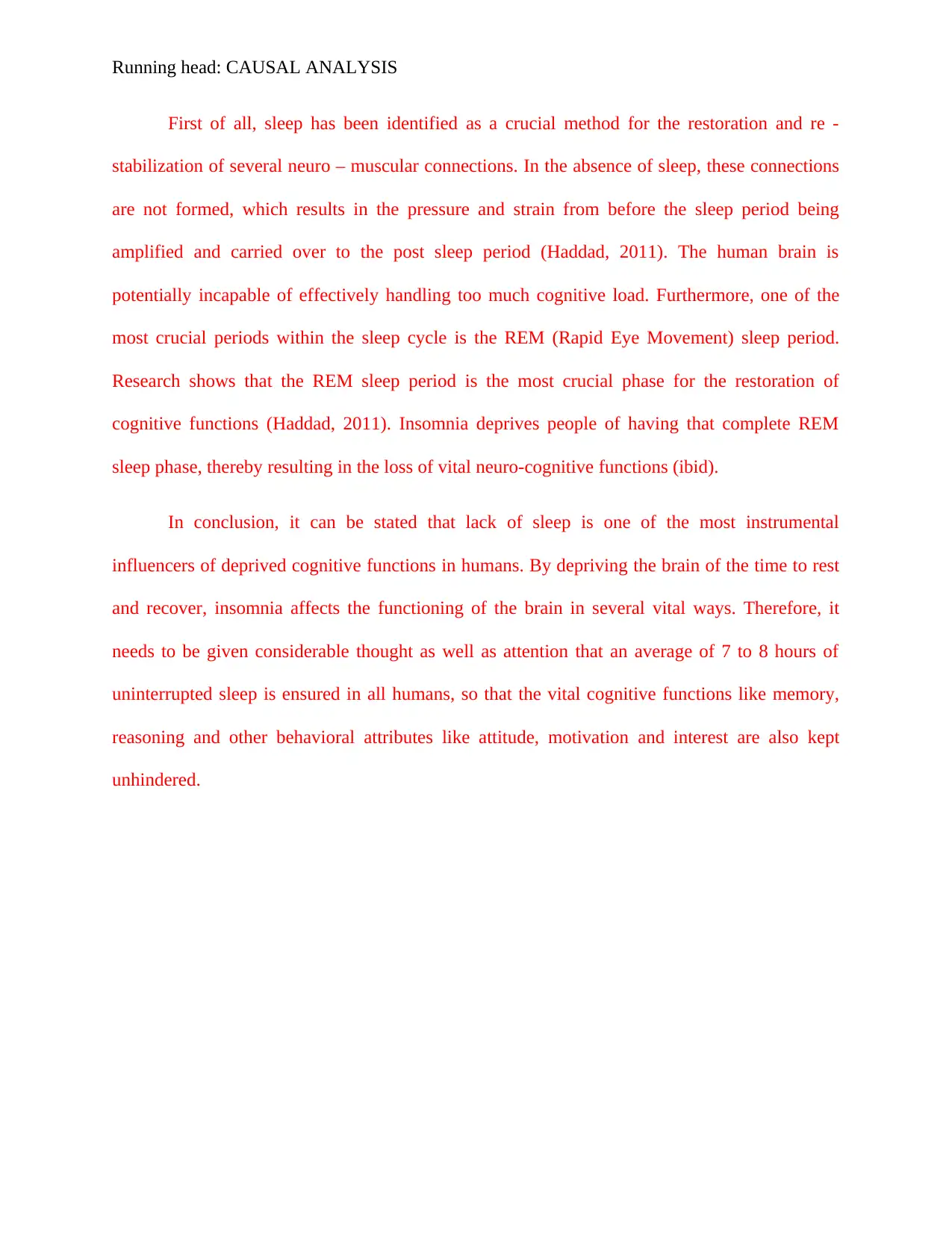
Running head: CAUSAL ANALYSIS
First of all, sleep has been identified as a crucial method for the restoration and re -
stabilization of several neuro – muscular connections. In the absence of sleep, these connections
are not formed, which results in the pressure and strain from before the sleep period being
amplified and carried over to the post sleep period (Haddad, 2011). The human brain is
potentially incapable of effectively handling too much cognitive load. Furthermore, one of the
most crucial periods within the sleep cycle is the REM (Rapid Eye Movement) sleep period.
Research shows that the REM sleep period is the most crucial phase for the restoration of
cognitive functions (Haddad, 2011). Insomnia deprives people of having that complete REM
sleep phase, thereby resulting in the loss of vital neuro-cognitive functions (ibid).
In conclusion, it can be stated that lack of sleep is one of the most instrumental
influencers of deprived cognitive functions in humans. By depriving the brain of the time to rest
and recover, insomnia affects the functioning of the brain in several vital ways. Therefore, it
needs to be given considerable thought as well as attention that an average of 7 to 8 hours of
uninterrupted sleep is ensured in all humans, so that the vital cognitive functions like memory,
reasoning and other behavioral attributes like attitude, motivation and interest are also kept
unhindered.
First of all, sleep has been identified as a crucial method for the restoration and re -
stabilization of several neuro – muscular connections. In the absence of sleep, these connections
are not formed, which results in the pressure and strain from before the sleep period being
amplified and carried over to the post sleep period (Haddad, 2011). The human brain is
potentially incapable of effectively handling too much cognitive load. Furthermore, one of the
most crucial periods within the sleep cycle is the REM (Rapid Eye Movement) sleep period.
Research shows that the REM sleep period is the most crucial phase for the restoration of
cognitive functions (Haddad, 2011). Insomnia deprives people of having that complete REM
sleep phase, thereby resulting in the loss of vital neuro-cognitive functions (ibid).
In conclusion, it can be stated that lack of sleep is one of the most instrumental
influencers of deprived cognitive functions in humans. By depriving the brain of the time to rest
and recover, insomnia affects the functioning of the brain in several vital ways. Therefore, it
needs to be given considerable thought as well as attention that an average of 7 to 8 hours of
uninterrupted sleep is ensured in all humans, so that the vital cognitive functions like memory,
reasoning and other behavioral attributes like attitude, motivation and interest are also kept
unhindered.
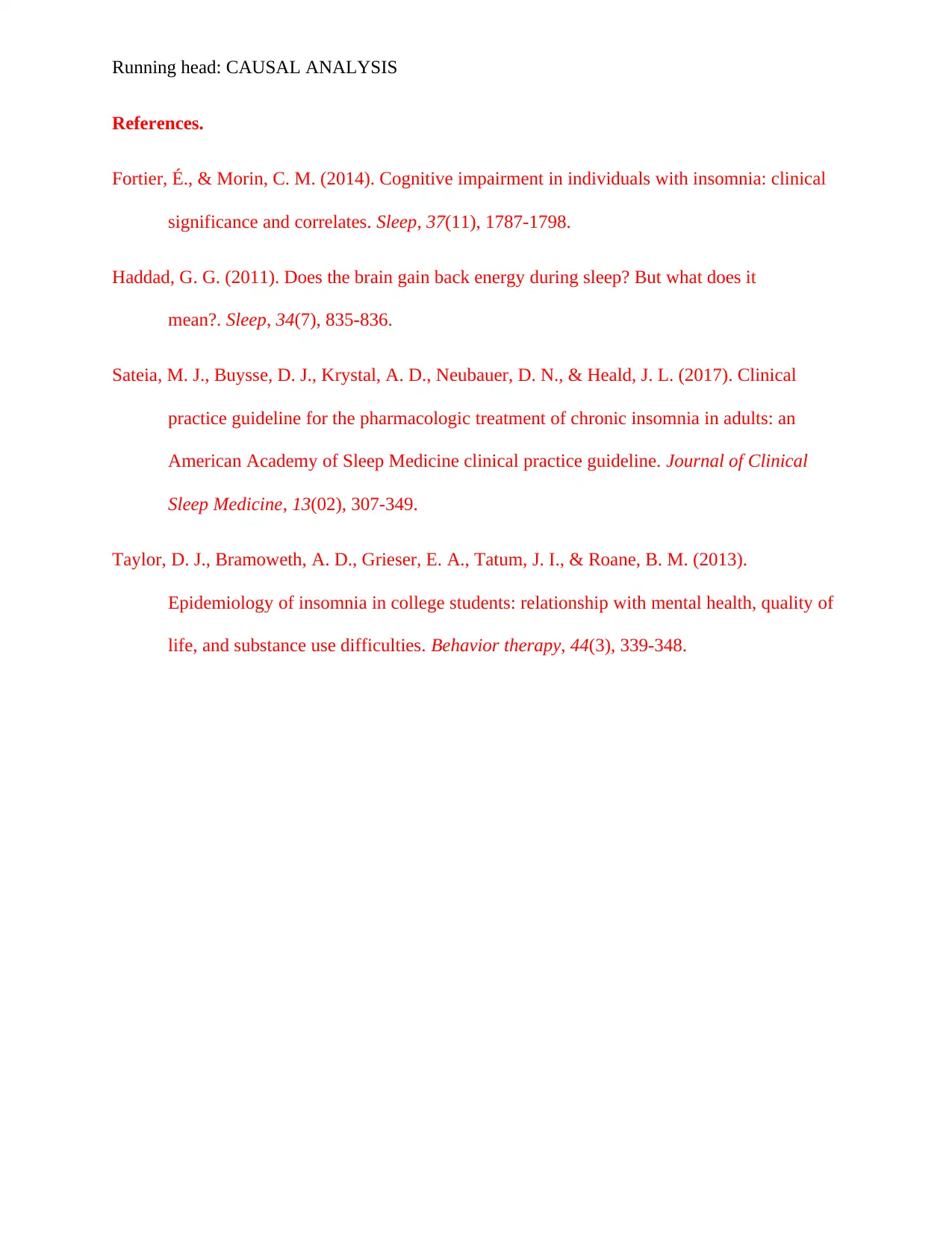
Running head: CAUSAL ANALYSIS
References.
Fortier, É., & Morin, C. M. (2014). Cognitive impairment in individuals with insomnia: clinical
significance and correlates. Sleep, 37(11), 1787-1798.
Haddad, G. G. (2011). Does the brain gain back energy during sleep? But what does it
mean?. Sleep, 34(7), 835-836.
Sateia, M. J., Buysse, D. J., Krystal, A. D., Neubauer, D. N., & Heald, J. L. (2017). Clinical
practice guideline for the pharmacologic treatment of chronic insomnia in adults: an
American Academy of Sleep Medicine clinical practice guideline. Journal of Clinical
Sleep Medicine, 13(02), 307-349.
Taylor, D. J., Bramoweth, A. D., Grieser, E. A., Tatum, J. I., & Roane, B. M. (2013).
Epidemiology of insomnia in college students: relationship with mental health, quality of
life, and substance use difficulties. Behavior therapy, 44(3), 339-348.
References.
Fortier, É., & Morin, C. M. (2014). Cognitive impairment in individuals with insomnia: clinical
significance and correlates. Sleep, 37(11), 1787-1798.
Haddad, G. G. (2011). Does the brain gain back energy during sleep? But what does it
mean?. Sleep, 34(7), 835-836.
Sateia, M. J., Buysse, D. J., Krystal, A. D., Neubauer, D. N., & Heald, J. L. (2017). Clinical
practice guideline for the pharmacologic treatment of chronic insomnia in adults: an
American Academy of Sleep Medicine clinical practice guideline. Journal of Clinical
Sleep Medicine, 13(02), 307-349.
Taylor, D. J., Bramoweth, A. D., Grieser, E. A., Tatum, J. I., & Roane, B. M. (2013).
Epidemiology of insomnia in college students: relationship with mental health, quality of
life, and substance use difficulties. Behavior therapy, 44(3), 339-348.
⊘ This is a preview!⊘
Do you want full access?
Subscribe today to unlock all pages.

Trusted by 1+ million students worldwide
1 out of 6
Your All-in-One AI-Powered Toolkit for Academic Success.
+13062052269
info@desklib.com
Available 24*7 on WhatsApp / Email
![[object Object]](/_next/static/media/star-bottom.7253800d.svg)
Unlock your academic potential
© 2024 | Zucol Services PVT LTD | All rights reserved.
